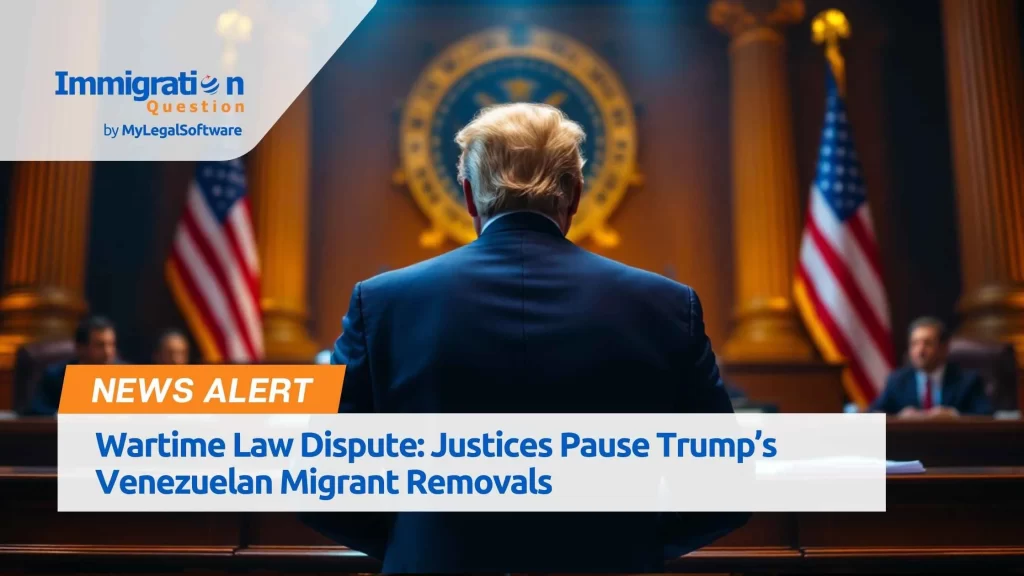The Supreme Court has paused deportations of Venezuelan migrants under the Alien Enemies Act, citing lack of due process. The Trump administration’s wartime-era strategy faces scrutiny as legal proceedings continue in the 5th Circuit Court.
Supreme Court Steps in Amid Wartime Law Controversy
The U.S. Supreme Court has extended its pause on the Trump administration’s use of a centuries-old wartime law to deport Venezuelan migrants. The Alien Enemies Act of 1798, to which the government has often turned to deport foreign nationals deemed a threat to national security during times of war, is at the epicenter of the scandal. The Trump administration expedited the deportation of scores of Venezuelan detainees from an immigration center in Texas by using the law to circumvent conventional legal protections. Citing grave concerns regarding the denial of due process, the Court’s ruling temporarily prohibits those removals.
Deportation and Due Process: A Legal Conflict
The administration was trying to deport migrants without giving them enough notice or a chance to contest the removal orders, according to an emergency request that the American Civil Liberties Union (ACLU) filed with the Court. In many cases, detainees were notified less than 24 hours before being placed on buses to the airport without instructions on exercising their legal rights.
The justices agreed that such rushed deportations failed to meet basic constitutional standards. The Court emphasized that any removal effort, even under wartime authority, must give individuals a fair chance to contest their deportation.
Division on the Bench
While the Court issued the opinion without attribution, Justices Samuel Alito and Clarence Thomas dissented publicly. Alito was doubtful of the granting of blanket relief to a class rather than reviewing the special facts of each case and questioned the authority of the Court to intervene at this stage of the case. The decision reflects intrachamber disagreement on the extent of the power of the executive branch and the necessity of formalistic justice in immigration enforcement, even with the conservative complexion of the Court.
Trump Justifies His Quick Deportation Strategies
In cases involving suspected members of Tren de Aragua, a violent Venezuelan gang that the U.S. State Department has designated a foreign terrorist organization, President Trump has defended the use of the Alien Enemies Act as essential for national security.
Critics claim that the transfer of deported migrants to a maximum-security anti-terrorism prison under an agreement with El Salvador is both extreme and illegal. The administration maintains that these actions are warranted, but migrants and their lawyers say they were never allowed to prove their gang affiliations.
Historical Precedents Raise New Questions
Since World War II, when it permitted the incarceration and deportation of people from Axis powers, the Alien Enemies Act has not been applied on this magnitude. A national discussion concerning the applicability and legality of this wartime law in a non-war setting has been triggered by its application to current immigration enforcement.
In this case, the Supreme Court has intervened twice to restrict the Trump administration’s application of the statute, demonstrating the judiciary’s growing concern over executive overreach.
What’s Next?
The 5th U.S. Circuit Court of Appeals will now take up the case, determining what procedural safeguards are constitutionally required under the Alien Enemies Act. While the administration may still pursue deportations under other provisions of immigration law, its broad use of wartime authority is now under intense judicial scrutiny.
As this legal battle unfolds, the outcome could redefine how far a president can go using national security powers to enforce immigration policy.
To stay up-to-date and informed, visit our news page, ask your immigration questions on Immigration Question, and get responses from licensed attorneys. For attorneys, streamline your case and lead management when you download the Immigration Question app.










